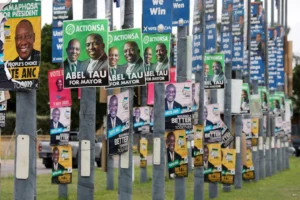ANC allows the electoral bill, opposition parties against it
Despite strong resistance from opposition parties and a throng of civil society organisations, the ANC used its majority in the National Assembly to get the contentious Electoral Amendment Bill through.
Seven parties in the National Assembly opposed the law, which will allow independent candidates to run in national and provincial elections for the first time in 2024, while the ANC, the EFF, the PAC, the NFP, and Al Jamah backed it.
The DA, IFP, FF Plus, ACDP, UDM, COPE, and ATM are among the parties that opposed the law.
The AIC and the Good Party did not vote. The Electoral Act was found to be unconstitutional by the Constitutional Court in June 2020 because it did not permit anyone to be elected to parliament other than through the political party list system. This led to the creation of the bill.
The ConCourt allowed parliament 24 months to address the constitutional flaw, but that period was extended at the legislature’s request after home affairs minister Aaron Motsoaledi’s late submission of the bill for consideration.

After being passed by 232 votes to 98, parties opposing the measure will now present their case for “significant” amendments to the National Council of Provinces, where it will be reviewed for concurrence.
During the contentious discussion, lawmakers opposed to the bill contended that it disadvantages independent candidates in its current form.
Similar arguments have been made against the bill by civil society organizations who oppose it, including Defend our Democracy, My Vote Counts, and the Council for the Advancement of the SA Constitution.
This was due to the fact that parties just needed 1,000 supporters but independent candidates needed to have a minimum of 20,000 in the province or district they sought to run in.
Only one seat in the National Assembly would be made available to independent candidates through a sufficient number of votes from a single region or province, with the remaining votes from other provinces having no bearing.
Adrian Roos, a DA MP, launched the opening salvo.
“The bill’s exclusion of independent candidates from being listed on the proportional representation list is the first obvious flaw. It calls for allowing them to run for election to the National Assembly in each province.
“The remainder of their votes are disregarded, and they can only win one seat in the national assembly from a single province. They must, however, pay the price and submit petitions for support in each province.
As a result, an independent may receive enough votes from different provinces to win a seat but may not receive one.
Additionally, they are prohibited from running for 200 of the 400 open seats. This is unjust,” Roos remarked.
Thapelo Mogale of the EFF referred to criticism of the law as “nonsensical.”
“We reject with disgust these absurd letters sent by organizations like Right2Know, Rivonia Circle, Helen Suzman Foundation, My Vote Counts, and all these bogus organizations which have no constituencies,” said Mogale.
Liezl van der Merwe of the IFP disagreed, claiming that the National Assembly hurried the measure and the procedure for additional public consultation, particularly the threshold allowing for independent participation. Although including independent candidates “is a step in the right direction,” UDM leader Bantu Holomisa claimed that the revisions made by MPs on Thursday “do not go far enough.”
Since the days of the now-defunct Idasa, the UDM has promoted the idea of an electoral system that is primarily based on constituencies, a mixed system of proportional representation and constituencies, similar to what we currently have at the municipal level and which will increase accountability to the electorate.
Brandon Pillay, an ANC member of parliament, argued that the ANC’s preference for the PR system was really in the interests of the minor parties.
“The ANC would have chosen the constituency-based system if its primary goal was to win elections. Geographic representation is dominated by the ANC nationwide. However, as a party, we have continuously shown what is beneficial to the constitution.
Motsoaledi downplayed the criticism, claiming that a large portion of it was “misunderstood” to mean that the ConCourt verdict had mandated that parliament modify the election legislation in addition to guaranteeing the participation of independents.
Also read: Mabuza says he is not done yet
